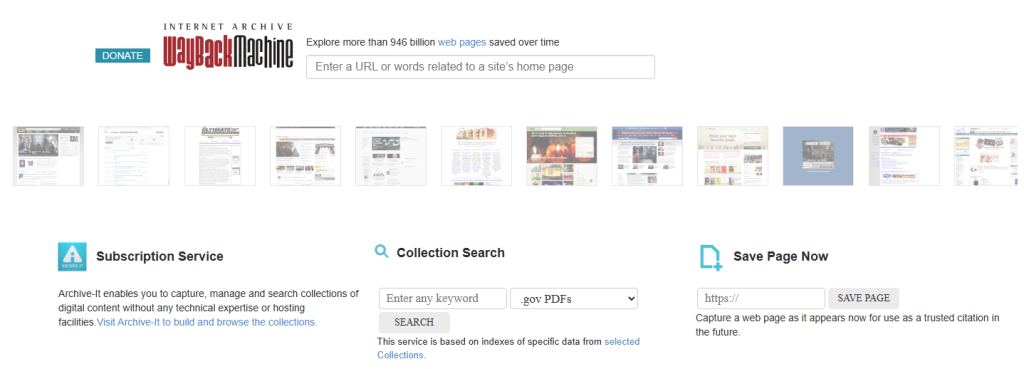In 2024, Google made the decision to remove Google’s cached pages. This was a major move that has impacted many previously cached websites.
So, what was Google Cache, and why does it no longer exist?
In this guide, you will learn the following about cache in Google search:
- What Were Cached Pages on Google
- The Purpose of Google Cache Web
- Why Google Cache No Longer Exists
Understanding Cache Site Web: What Were Google Cached Pages?
Caching pages was something Google did to keep records of the way websites looked at a particular time. Website owners could then access these Google web page caches by searching for the page’s URL and using the Cached link. There were two different cached versions of a website:
- Full Version: This is when Google has completely cached a page. This version shows you everything, from the website’s ads to the banners to the images to the text. A full version site cache Google is essentially an exact replica.
- Text-Only: As the name suggests, the text-only page cache Google contains only the text of a cached page. There is no formatting or visual content like videos included here, thus providing a straightforward way to view cached site.
What Was the Point of Google Cache?
Think of a website cache like a backup in times when a website may not be working. You could look at cached web pages during these times. This point of a cached website was primarily for website searchers, as it means they can access a website’s content by viewing page cache.
At the same time, Google cached web pages were also useful for website owners, particularly in times when a website crashes. If this happened, you could still display your website’s content to users with a cached website or cached page.
On top of that, you could use your cached internet site to learn more about any problems your website may have (although there were limitations here).
Using Google Cache Search as a Website Owner
In a pinch, a Google cached website gave you useful information to help your SEO efforts as a website owner. So, here were some of the ways to use Google web page cache.
Checking for Duplicate Pages
One of the biggest uses of cached web pages was that it told you if Google believed two or more of your website pages were duplicates. For SEO purposes, you want to avoid duplicate pages, so this information was beneficial.
Keeping an Eye on the Competition
You could get a cached version of a website belonging to someone else, which was helpful for keeping an eye on the competition, which is crucial in the world of SEO. By checking a website’s cached version, you could see the exact changes they had made recently. This cached version would indicate the adjustments they made to boost their SEO rankings.
Disaster Recovery
In times of dire need, website owners could search for cached pages from Google. For example, when a website had crashed or been hacked. In this situation, the Google cached version of the site/page provided a temporary backup.
Identifying SEO Issues
Searching Google cached pages could also be useful for identifying SEO issues. This included indexed content, rendering issues, and mobile friendliness – although there were some limitations here.
Google Cache Lookup Limitations
In some cases, caching web pages was not always helpful. For example, website owners often wanted to remove a page or website in cache that was no longer relevant, such as a page on outdated information. In this situation, you could find cached web pages to remove them, but that required additional effort.
Plus, cache Google would only show you the latest version of a cached website page. So, you may have wanted to view what your website page looked like a year ago, but since Google performed a web page cache a week ago, you would not have been able to view that older version.
Webcache Google Search was simply not a full backup. It could be handy in some situations, offering website owners access to diagnostics, but there were always better tools for the job. So, just because you cannot view cached web pages any longer, that doesn’t mean your insights have been taken away, as there are other tools that do the same job (or similar) to cache web Google, which we will dive into further down.
When Did Google Remove Web Cache Websites?
You can no longer find a Google cache of a website, as Google got rid of its caching feature in February 2024. Google cache and web cache viewer had been around since the late 90s, so it was a 26-year-old feature by the time Google retired it.
Why Do Google Cache Sites No Longer Exist?
The cache site internet now lives in the past – you can no longer view a cached version of a site/a cached view of a website. This has made knowing things like how to clear cache in Google search obsolete – it is no longer necessary!
So, did the change happen? What was the point?
Here is what Google said on X (formerly Twitter) about it:
“Hey, catching up. Yes, it’s been removed. I know, it’s sad. I’m sad too. It’s one of our oldest features. But it was meant for helping people access pages when way back, you often couldn’t depend on a page loading. These days, things have greatly improved. So, it was decided to retire it.”
Google also went on to say that anyone with a Google Search Console account could still see what the Google crawlers saw when looking at website pages by using URL Inspector.
So, the main reason Google web cache search no longer exists is due to improved web reliability. Google cached websites were useful when web pages would not load properly. Twenty years ago, this feature was nearly essential, as websites were highly susceptible to server issues and slow loading times – this is no longer the case.
Some other reasons make the retirement of Google Cache reasonable. This includes:
- More Storage Room: Storing cached versions of websites requires a lot of storage and power. By freeing up this room, Google can use those resources elsewhere, in areas that are more helpful for website users.
- Better Security: Cached versions of websites may not have had the same security features as updated web pages.
- Less Confusion: Users may have viewed cached website Google pages and become confused, perhaps assuming the old version was still up-to-date.
What Are Some Alternatives to Google Cache Site Search?
Are you feeling a little lost now that the web doesn’t show cached pages from Google? The good news is that there are several great alternatives available.
Wayback Machine
Wayback Machine is an enormous online database owned by the Internet Archive. Much like Google Cache, it shows you old versions of websites and pages, including the exact dates and when changes occurred. All you need to do to use Wayback Machine is head to its website (web.archive.org) and then type in the URL of the page you want to access.
Caches from Other Search Engines
Sometimes, it is easy to forget that Google is not the only search engine that matters! While Google certainly is the biggest search engine available, there are others, such as Bing and Yahoo!. Both of these offer cached versions of websites. So, if you loved Google web cache search, then consider using these alternatives.
URL Inspection Tool
Google Search Console offers the URL inspection tool. This provides real-time insights into the way Googlebot views and indexes your website’s pages. While this tool isn’t exactly like Google Cache, as it does not store old versions of pages, it does provide SEO insights that can be helpful.
Other SEO Tools
There are plenty of other excellent SEO tools that have features like crawling and understanding how Google views a website page. Much of the time, these SEO tools are more advanced than Google Caching ever was.
Google Search Cache: Key Summaries
- Google once stored old versions of website pages, called Google Cache.
- Google no longer shows a cached version of a website.
- Google Cache was useful for both web users and website owners.
- There are alternatives to Google Cache, such as URL Inspection Tool and Wayback Machine.
Are You Looking for Ways to Boost Your Search Engine Rankings?
While you can’t find Google cached pages any longer, there are still a myriad of ways to boost your SEO rankings, and that’s what we specialise in here at Click Intelligence.
We have over twenty years of experience in SEO and digital marketing as a whole. We are an expert, friendly team of passionate digital marketers who are more than happy to assist you on your journey towards better branding and higher rankings.
Whether you are interested in an advanced SEO report, content marketing, local SEO, or link building, we are here to help – get in touch today to get started!


